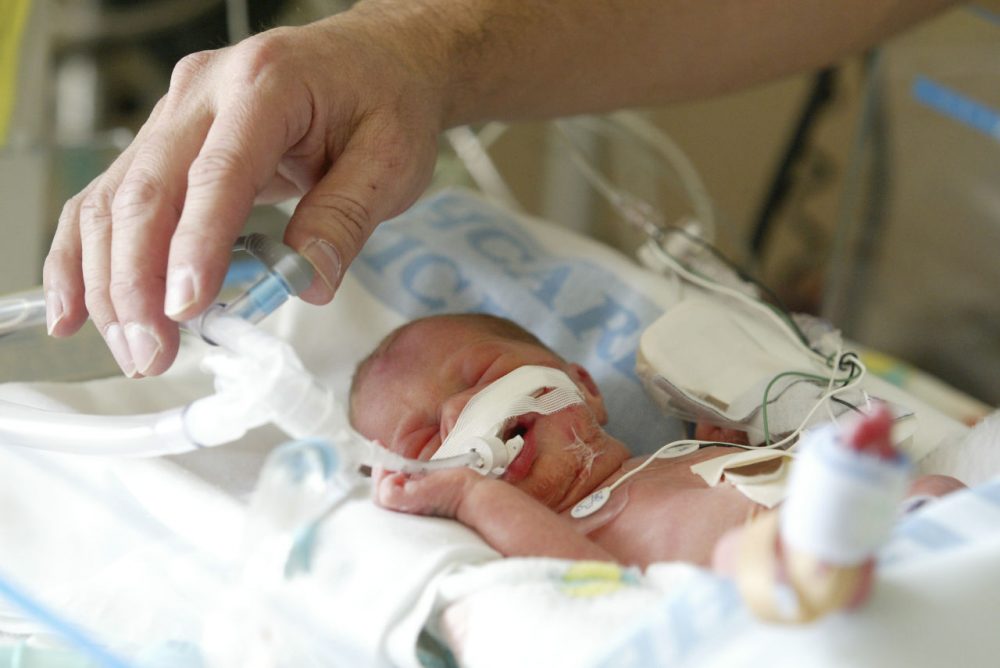Advertisement
Calls For Better Pain Relief Measures For Newborns, Premature Infants

What could be more heartbreaking than witnessing some of the smallest, sickest babies undergoing painful medical procedures?
Yet that's precisely the population subject to some of the most intrusive prodding and pricking, the "greatest number of painful stimuli" in the neonatal intensive care unit, or NICU.
Now the American Association of Pediatricians is calling for better, more comprehensive pain relief measures for newborns, including those born prematurely — both with medications and through alternative, non-drug measures — and for more research on effective treatments.
The AAP's updated policy statement, published in the journal Pediatrics, asserts that "although there are major gaps in our knowledge regarding the most effective way to prevent and relieve pain in neonates, proven and safe therapies are currently underused for routine minor yet painful procedures."
The AAP calls for new measures, specifically:
Every health care facility caring for neonates should implement an effective pain-prevention program, which includes strategies for routinely assessing pain, minimizing the number of painful procedures performed, effectively using pharmacologic and nonpharmacologic therapies for the prevention of pain associated with routine minor procedures, and eliminating pain associated with surgery and other major procedures.
If you've ever been in a NICU, you may have seen these types of procedures take place: suctioning of various secretions from the nose and throat; blood draws from veins, arteries, feet or heels; IVs being placed; adhesive tape — used to keep all those tubes and IVs in place — removed.
A landmark 2008 study from France found that the vast majority of newborns in the NICU didn't get pain relief; researchers found only about 21 percent of infants were given either pain medication or non-drug pain relief before undergoing a painful procedure.
Why is this important?
According to the new AAP statement:
The prevention and alleviation of pain in neonates, particularly preterm infants, is important not only because it is ethical but also because exposure to repeated painful stimuli early in life is known to have short- and long-term adverse sequelae [aftereffects]. These sequelae include physiologic instability, altered brain development, and abnormal neurodevelopment ... which can persist into childhood.
Navil F. Sethna, M.D, one of the lead authors of the updated AAP guidelines, and a senior anesthesiologist at Boston Children’s Hospital, said in an interview that the most important takeaway is this:
"Even premature infants do feel pain and their pain needs to be treated...their pain can have long-term, negative consequences in the development of the nervous system. That's the message: even though there are controversies [about what is the best medication and about adverse effects of the drugs, for instance] overall, we are obligated to treat the pain, because not treating the pain can have serious consequences for the developing brain.
Sethna said 20 to 30 years ago, there was a widespread misconception that premature babies didn't feel pain because their nervous system wasn't fully developed. Now, it's clear that's not the case. "We know now that infants do respond to pain," he said, "and we have more objective data, observed data where we see them crying, wincing, and withdrawing as a result of painful stimulus, but we also know they have the capability of releasing stress hormones in response to tissue injury — that could be during surgery, or when they get stuck with a needle."
Technology has also made an impact, he said. "We now have functional MRI, so in the last few years...studies coming out show how infants of different ages, when they're exposed to pain what happens to their brains...A lot of studies have shown if infants are exposed to intense pain, like a burn, or daily and relatively minor procedures such as the heel stick to draw blood in the intensive care unit, their behavior and cognitive function (and sensitivity to pain] is abnormal compare to those not exposed to intense pain."
He added: "We don't have all the answers...but this new information, these new studies make us think about how important it is to treat the pain, and also do more research to find better medications to treat the pain with minimal adverse effects and also reduce any short-and long-term consequences from not treating the pain."
Baruch Krauss, a senior associate physician at Children's Hospital Boston who specializes in alleviating pain in pediatric patients, said the new AAP guidelines are "much needed." He sent me his thoughts via email:
This is a much needed third iteration of guidelines from the AAP for prevention and management of procedural pain in neonates. The first guidelines were published in 2000 and the second in 2006 ... In this case, there have been considerable advances in our understanding of: 1) the short and long-term impact of repeated painful procedures on the neonate and premature infant; 2) the effectiveness of nonpharmacologic treatment strategies; and 3) an increased concern for the potential adverse effects of anesthetic drugs on the developing brain since 2006 when the last guidelines were published. Further, there has also been mounting evidence that there is a gap between published recommendations/guidelines and clinical practice, with underutilization of pain assessment and treatment strategies.
So I think the present guidelines are both a comprehensive update of the latest research with very clear evidence-based recommendations as well as an important and necessary call for increased awareness in this area. The update also highlights the many aspects of this area that we do not understand and calls for focused research.
According to the AAP report, pain relief for these babies includes a range of options, from glucose and sucrose, to topical anesthetics to opioids and benzodiazepines — although these drugs obviously have possible downsides too.
As for the non-drug options, Krauss said there are quite a few, including "sucking on [a] pacifier, skin-to-skin care and contact, swaddling and positioning, massage and breastfeeding."
